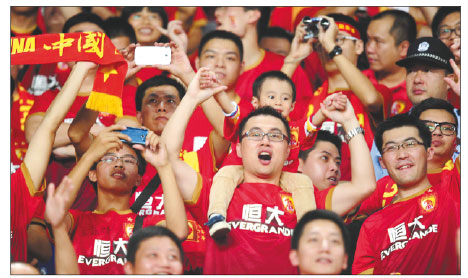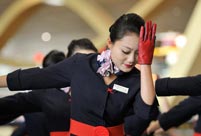 Int'l Snow Sculpture Art Expo in Harbin
Int'l Snow Sculpture Art Expo in Harbin Sichuan money wall for dividend payment
Sichuan money wall for dividend payment Li Na crashes Belinda Bencic in 2nd round at Australian Open
Li Na crashes Belinda Bencic in 2nd round at Australian Open
 Shocking moments when PLA's weapons open fire
Shocking moments when PLA's weapons open fire Famous Lanzhou beef noodles
Famous Lanzhou beef noodles Armed Police hold anti-terrorism drill in SE China's Xiamen
Armed Police hold anti-terrorism drill in SE China's Xiamen Harbin Int'l Ice and Snow Festival opens
Harbin Int'l Ice and Snow Festival opens 'Jin' named the word of the year by cross-strait netizens
'Jin' named the word of the year by cross-strait netizens Chinese scientific expedition goes to build new Antarctica station
Chinese scientific expedition goes to build new Antarctica station
 |
| Fans of Guangzhou Evergrande cheer for their team during a match in Guangzhou, Guangdong province, on Nov 9. The team clinched their first AFC Champions title with a 1-1 draw with FC Seoul. WU JUN / FOR CHINA DAILY |
The national governing body for soccer has passed institutional reforms that it hopes will help revitalize the sport in China, after several years of poor performance and corruption scandals.
The reforms, centered around a more market-oriented approach and the separation of supervisory and management powers, are expected to put Chinese soccer back on track.
Disappointing match results and a shrinking pool of talent saw Chinese soccer struggling over the last decade, with the sport failing to reach most of the objectives laid out in its 10-year development blueprint.
The men's national team hasn't reached the final stage of the World Cup since 2002 and struggled to compete in Asia after losing 5-1 to Thailand in a friendly last June. The women's national squad also slid down the world rankings.
Still, the newly elected soccer governing body said it expects the sport to be revitalized through further professional reform on league management and youth development.
"Professional development doesn't only mean spending heavily on hiring a renowned foreign coach and importing big-name foreign players; it requires the whole soccer management system to function professionally within a solid structure," said Cai Zhenhua, new president of the Chinese Football Association.
Cai made the remarks at the conclusion of a speech at the association's 10th national congress on Wednesday. The association elected its new executive board, including Cai, seven vice-presidents and two consultants at the congress. It also amended its long-standing constitution to deepen reforms.
According to the adjustment, the association will cancel its league department, which used to centralize management powers for all levels of domestic leagues, handing more decision-making rights to the Chinese Super League company, which was formed by 16 club shareholders in 2005 to run the league.
The association will also set up as many as 15 departments, including an independent legal department, an ethics and fair-play committee and an arbitration board to monitor the league's healthy operation.
"We will place specialized talents in different positions to take charge of various jobs, instead of doing everything through the association like before," said Zhang Jian, the new secretary-general of the CFA.
Such moves are expected to solve the problem that the CFA both operated and supervised the league, which has provided a breeding ground for match-fixing and bribery scandals, said congress representatives.
"The institutional change shows the CFA's efforts to separate itself from league operation and only serve as a supervisor, which is in line with international practice," said Wang Qi, president of second-tier league club Shenzhen Ruby.
Chen Peide, former chief of Zhejiang provincial soccer administration, echoed Wang's sentiment, saying defining the association and league companies' respective roles will help Chinese soccer develop in a more professional way.
Meanwhile, the CFA expects to enlarge the scale of the pro-league system by encouraging more private investors to establish clubs.
According to the new 10-year plan released at the congress, there should be at least 38 second- and third-tier league clubs by 2023, 12 more than the current amount, thus strengthening the game's foundation.
Yu Changlong, representative from second-level club Jilin Yanbian FC, called for more rights on commercial development and talent drafting to be given to lower clubs. Their affiliated local sports bureaus currently wield most of the power.
At the higher level, market-oriented operation, as exemplified by the new AFC Champions League winner Guangzhou Evergrande, should be promoted, said insiders.
Since being taken over by real estate company Evergrande in 2010, the Cantonese club has boasted professional management led by Italian manager Marcello Lippi, a youth training system and a rewards mechanism that motivates players.
Its impressive results in both the domestic league (three consecutive top-league titles from 2011 to 2013) and Asian competitions have won praise from China's top leaders.
"Evergrande has helped improve Chinese soccer's image internationally and set an example for professionalization," said Cai.
Sun Wen, former women's national captain and FIFA Female Player of the 20th Century, said Evergrande's huge investment was eye-catching and its businesslike operations will help it stay successful.
A solid professional league system is hoped to benefit the national team, and the 10-year plan envisions both the male and female national squads dominating Asia and challenging the world's best.
 Int'l Snow Sculpture Art Expo in Harbin
Int'l Snow Sculpture Art Expo in Harbin Highlights of China's air force
Highlights of China's air force Airline crew stage flashmob dance at Kunming airport
Airline crew stage flashmob dance at Kunming airport Asia's heaviest box girder finishes 'rotation' in Wuhan
Asia's heaviest box girder finishes 'rotation' in Wuhan Hot supermodel's new photo album released
Hot supermodel's new photo album released Top15 countries to retire to in 2014
Top15 countries to retire to in 2014 Chinese-branded car passes North America standard safety test for the first time
Chinese-branded car passes North America standard safety test for the first time Chinese naval escort taskforce repels 4 suspicious vessels
Chinese naval escort taskforce repels 4 suspicious vessels Xuelong carries on mission after breaking from floes
Xuelong carries on mission after breaking from floes Li Na beats Bouchard to reach Australian final
Li Na beats Bouchard to reach Australian final  Explore the sources of PM 2.5
Explore the sources of PM 2.5 Highlights of Chinese airborne troops'exercises
Highlights of Chinese airborne troops'exercises  'Living in ice house' competition held in central China
'Living in ice house' competition held in central China  Chinese figure in Oscar nominations
Chinese figure in Oscar nominations  Top ten aerospace events in China 2013
Top ten aerospace events in China 2013Day|Week|Month